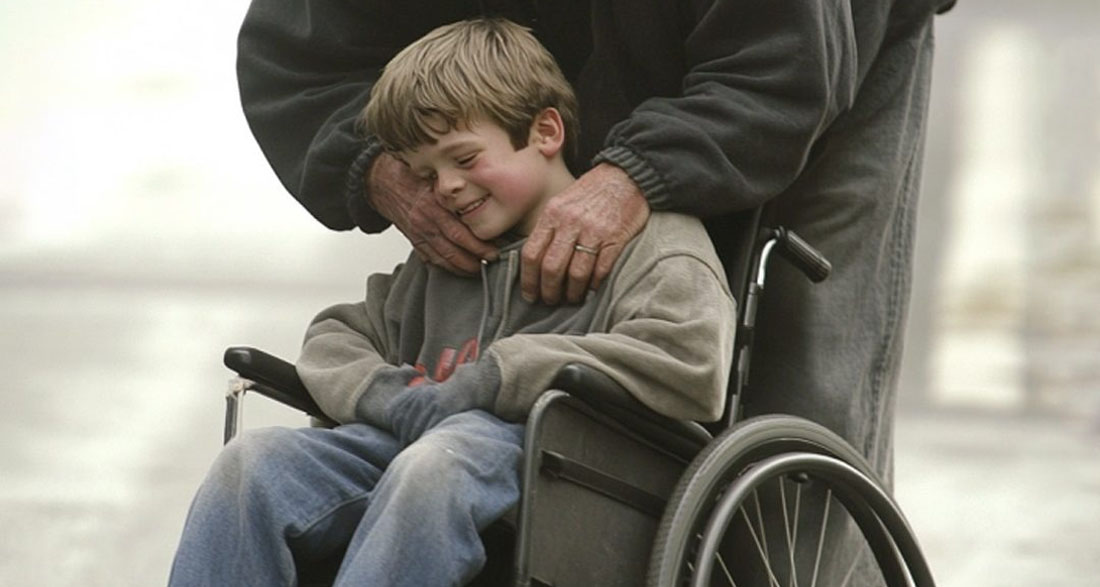It was just another day in the city square, but for me, it was a day that would change everything. I sat there, playing my flute, letting the music carry me away from the pain that never seemed to leave my body.
For fifteen years, I’d been homeless, living on the streets, but music was my escape. It was the one thing that made me feel alive.
I used to work in a factory, surrounded by the hum of machines and the laughter of my coworkers. But then the pain started—first in my lower back, then in my hips. It got so bad that I could barely stand.
I went to the doctor, hoping for good news, but instead, I got a diagnosis that shattered my world. My condition was incurable, and it would only get worse. The factory let me go, and soon, I lost my home too. The only thing I had left was a wheelchair my coworkers gave me on my last day. It was a kind gesture, but it was also a reminder of how much I’d lost.
That day in the square, as I played a familiar tune, a boy’s voice cut through the music.
“Mama, listen! It’s so beautiful!” he said, his eyes wide with wonder.
I looked up and saw a tired woman holding a little boy in her arms. He couldn’t have been more than eight years old. His mother looked exhausted, but when she saw how happy the music made him, her face softened.
“Can we stay a little longer? Please?” the boy begged.
His mother hesitated, then nodded. “Just a few more minutes, Tommy. We need to get to your appointment.”
I stopped playing and smiled at them. “Would you like to try playing?” I asked the boy.
Tommy’s face fell. “I can’t walk,” he said quietly. “It hurts too much.”
His mother explained that they couldn’t afford crutches or a wheelchair. She carried him everywhere, even though it was hard for her. Hearing their story felt like looking into a mirror. I knew what it was like to live with pain and to feel invisible to the world. But in Tommy’s eyes, I saw something I hadn’t felt in a long time—hope.
In that moment, I made a decision. I gripped the arms of my wheelchair and forced myself to stand, even though the pain was unbearable. “Take my wheelchair,” I said, forcing a smile. “I don’t really need it. It’s just been a convenience.”
Tommy’s mother looked shocked. “We couldn’t possibly…” she started to say.
But I insisted, pushing the wheelchair toward them. Tommy’s face lit up as his mother gently placed him in it. Tears filled her eyes. “I don’t know how to thank you,” she whispered.
“Your smiles are enough,” I said, even though my body was screaming in pain. As they left, I hobbled to a nearby bench and collapsed, my legs trembling. I knew I’d just given up something I relied on, but in my heart, I felt at peace. I had done the right thing.
Five years passed, and life didn’t get any easier. My pain grew worse, and I struggled to get by with just a pair of crutches. But I often thought about Tommy and his mother, wondering if my small act of kindness had made a difference.
Then, one day, as I played my flute in the square, a shadow fell over the cup where people tossed coins. I looked up and saw a teenager standing there, dressed in nice clothes and wearing a familiar smile.
“Hello, sir,” he said. “Do you remember me?”
My heart skipped a beat. “Tommy?” I asked, hardly believing my eyes.
He grinned. “I wondered if you’d recognize me.”
I stared at him, amazed. “You’re walking!”
“Life has a funny way of working out,” he said, sitting down beside me. He told me that not long after I gave him the wheelchair, his family received an unexpected inheritance from a distant relative. It was enough to get him the medical care he needed. Turns out, his condition was treatable all along.
“My mom started her own catering business, too,” he added proudly. “She’s living her dream now.”
Then Tommy handed me a long package wrapped in brown paper. “This is for you,” he said, his voice full of gratitude.
I unwrapped it carefully and found a sleek flute case inside. My hands trembled as I opened it. “This is too much…” I stammered.
“No, it isn’t,” Tommy said firmly. “I owe my happiness to you. Your kindness gave us hope when we needed it most.”
He hugged me tightly before leaving. That night, back in the dim basement where I lived, I opened the flute case again. Inside, I found stacks of cash—more money than I’d ever seen in my life. On top of the money was a handwritten note:
“This is for the pain you’ve endured because of your kindness. Thank you for showing us that miracles still happen.”
I sat there for hours, holding the note in my hands. The money wasn’t just about financial freedom—it was a reminder that even the smallest act of kindness can change lives. My decision to give Tommy my wheelchair had set off a chain of events that transformed his life, his mother’s life, and now, mine.
“One act of kindness,” I whispered to the empty room, tears streaming down my face. “That’s all it takes to change the world.”
What do you think of the story? Share your thoughts in the comments below!

